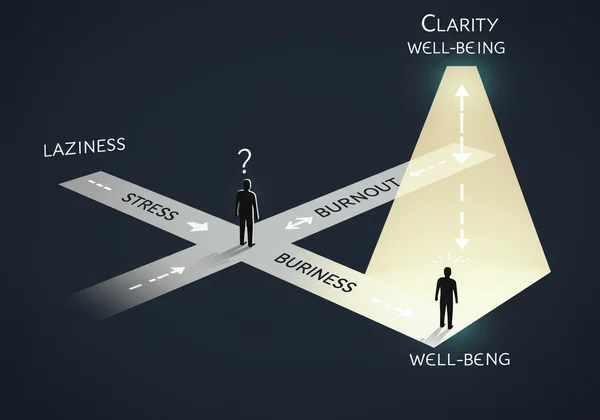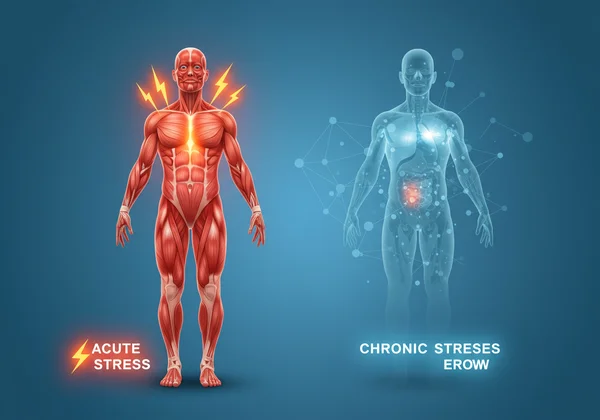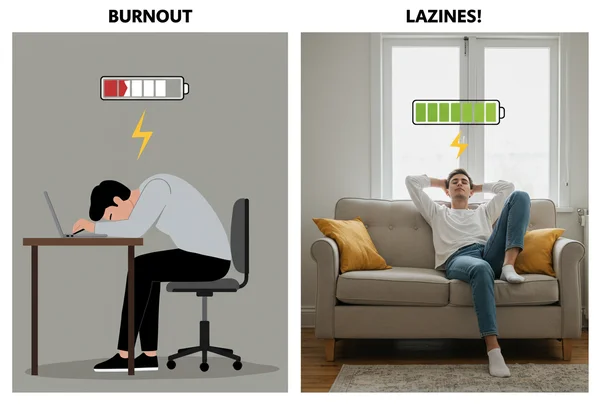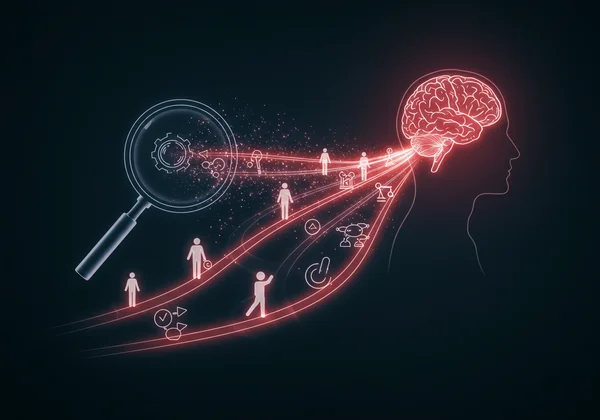Burnout vs. Stress vs. Laziness: A Burnout Test Guide
July 13, 2025 | By Eleanor Vance
Are you genuinely burnt out, merely stressed, or just experiencing a temporary dip in motivation? It's a question many professionals grapple with, leading to confusion and delayed action. The feeling of being overwhelmed can manifest in various ways, making it challenging to pinpoint the exact issue. Am I stressed or burnout? This guide will help you understand the crucial distinctions between burnout, stress, and what might be mistaken for laziness, revealing why clarity matters for your well-being. Knowing the difference is the first step towards finding effective solutions. A scientific assessment can provide the answers you need to better understand your current state and guide your next steps. To find out more and take a quick assessment, you can start your journey.

Understanding Burnout: More Than Just Being Tired
Burnout is not just a bad day or a need for a long weekend. It's a state of chronic physical and emotional exhaustion, often accompanied by feelings of cynicism and detachment. Unlike simple fatigue, which rest can alleviate, burnout requires a more comprehensive approach to recovery. It primarily stems from prolonged or excessive stress, particularly in the workplace. Recognizing its true nature is key to addressing it effectively and avoiding severe long-term consequences.
What Does Emotional Exhaustion Feel Like?
Emotional exhaustion is the hallmark of burnout. It manifests as a profound depletion of emotional resources, leaving you feeling drained, worn out, and unable to cope with the demands of your job or even daily life. You might feel a sense of dread when thinking about work or struggle to find the energy to face the day. This isn't just physical tiredness; it's a deep-seated weariness that affects your emotional capacity. Simple tasks feel overwhelming, and you might find yourself feeling irritable or tearful without clear reasons. It can feel like your emotional well is completely dry.
The Core Signs of Job Burnout
Beyond emotional exhaustion, job burnout presents with two other distinct characteristics. First, depersonalization or cynicism, where you feel detached from your work and colleagues. This can lead to a negative or uncaring attitude, a loss of empathy, and a tendency to view others as objects rather than individuals. Second, a reduced sense of personal accomplishment, where you feel ineffective and lack a sense of achievement. Despite putting in effort, you might believe your work doesn't matter or that you're not good enough, leading to decreased productivity and motivation. These symptoms combined paint a clear picture of occupational burnout. If these signs resonate with you, consider taking a free and anonymous online assessment to understand your situation better by taking our free online assessment here.
Decoding Stress: Your Body's Alert System
Stress, while often a precursor to burnout, is fundamentally different. It's your body's natural response to any demand or threat, preparing you for "fight or flight." Stress can be short-term or long-term, and while some stress is motivating, prolonged stress without adequate recovery can lead to serious health issues, including burnout. Understanding the nuances of stress is crucial for differentiating it from burnout and identifying when it transitions from manageable pressure to an overwhelming burden. A workplace stress test could help you identify your current stress levels.

Acute vs. Chronic Stress: The Key Differences
Acute stress is the immediate, short-term response to a perceived threat. Think of a tight deadline or a sudden argument; your heart races, your breath quickens, and your senses heighten. This type of stress is normal and can even be beneficial, helping you perform under pressure. However, chronic stress is prolonged and constant, arising from ongoing difficult situations like a demanding job, relationship issues, or financial worries. Unlike acute stress, chronic stress doesn't dissipate quickly. It keeps your body in a persistent state of alert, slowly eroding your physical and mental health. This sustained activation of your stress response system can lead to serious health issues over time.
When Stress Becomes Overwhelming: Symptoms of Your Body Shutting Down
When stress becomes unmanageable, your body can begin to exhibit severe reactions, sometimes described as symptoms of your body shutting down. This can include persistent fatigue, digestive problems, chronic headaches, muscle tension, sleep disturbances, and even a weakened immune system. Mentally, you might experience anxiety, irritability, difficulty concentrating, and a constant feeling of being overwhelmed. These are signals that your body and mind are struggling to cope with the relentless demands. While these symptoms overlap with burnout, they are primarily rooted in the overactivation of the stress response, rather than the profound emotional detachment characteristic of burnout.
The Myth of Laziness: Is It Truly Burnout?
One of the most painful aspects of experiencing burnout is the self-judgment that often accompanies it. Many individuals mistakenly believe they are simply lazy or unmotivated when, in reality, they are suffering from profound exhaustion. The question, "Is it burnout or am I just lazy?", reflects a common internal struggle. This misattribution can prevent people from seeking the help they need, deepening their distress. It's vital to approach this with compassion and self-awareness, understanding that true laziness is distinct from the debilitating effects of burnout.

Why Burnout Can Mimic Laziness
Burnout can indeed mimic laziness because its core symptoms—lack of motivation, procrastination, and reduced productivity—are often associated with a lack of effort. However, with burnout, these behaviors are not a choice but rather a consequence of depleted resources. Your brain and body are signaling that they can no longer function at the required capacity. What looks like apathy from the outside is often a protective mechanism: your system is conserving the little energy it has left. It's a forced slowdown, not a wilful disengagement.
Distinguishing Between Lack of Motivation and Burnout Fatigue
The key to distinguishing between genuine lack of motivation and burnout fatigue lies in their underlying causes and effects. If you're simply unmotivated, you might find joy and energy in other activities or pursuits. You might choose to procrastinate but still have the capacity to engage when necessary. With burnout fatigue, however, the exhaustion is pervasive. You feel drained even thinking about enjoyable activities, and the sense of depletion permeates all aspects of your life. The inability to get things done isn't a choice; it's a profound incapacity that affects both work and personal life. Understanding this distinction can free you from harsh self-criticism.
Why Accurate Self-Assessment Matters for Your Well-being
Understanding whether you're experiencing stress, burnout, or simply a temporary lack of motivation is more than just labeling a feeling; it's crucial for your well-being. Accurate self-assessment empowers you to choose the right strategies for recovery and prevention. Knowing "how to self assess burnout" can lead you toward tailored solutions that address the root cause of your struggles. Taking proactive steps can prevent mild issues from escalating into severe mental or physical health problems. A reliable tool, like an online burnout assessment, offers a clear starting point for this self-discovery.
The Risks of Misdiagnosis: What Can Burnout Be Mistaken For?
What can burnout be mistaken for? Without proper understanding, burnout is often confused with depression, anxiety, or simply being overwhelmed. While symptoms overlap, the underlying drivers and required interventions differ. Misdiagnosing burnout as laziness, for instance, can lead to self-blame and a failure to seek appropriate support. Conversely, mistaking severe stress for burnout might lead to an overly drastic response when targeted stress management could suffice. Accurate identification ensures you don't waste time or effort on ineffective strategies, allowing you to implement truly helpful interventions.
Empowering Your Recovery: Actionable Insights for Your Next Steps
The goal of accurate self-assessment is to gain actionable insights for your next steps. Once you understand the specific nature of your struggle, you can tailor your recovery plan. If it's chronic stress, you might focus on boundary setting and relaxation techniques. If it's burnout, you'll likely need a more profound period of rest, recalibration, and a reevaluation of your values and work environment. A scientific Burnout Test can help you pinpoint your current state and offer personalized guidance. This personalized approach empowers you to make informed decisions about your health, career, and overall quality of life, leading to a more effective and sustainable recovery.
Find Your Clarity: Take the Burnout Test Today

Navigating the complexities of work-life balance and mental well-being is a journey, and understanding your current state is the most critical first step. Distinguishing between burnout, stress, and temporary demotivation can be challenging, but it's a crucial part of taking charge of your health. Ready for clarity? Our free, science-backed assessment offers immediate insights into your emotional exhaustion, cynicism, and sense of personal accomplishment based on established psychological principles.
Don't let self-doubt or confusion prevent you from moving forward. Take a moment to gain valuable perspective on your well-being. The test is anonymous, quick, and designed to give you a foundational understanding. Visit our website to take the free assessment and discover your results instantly. If you need deeper insights, our optional AI-driven personalized report can provide tailored action plans to help you on your path to recovery and resilience. Empower yourself with knowledge and start your journey towards a healthier, more balanced life today.
Frequently Asked Questions About Burnout & Self-Assessment
Is it burnout or am I just lazy?
This is a common concern. True laziness is generally a choice, where you have the energy but choose not to exert it. Burnout, however, is an involuntary state of profound physical and emotional depletion, making it difficult or impossible to perform tasks, even those you enjoy. Your body and mind are signaling that they are out of resources. Taking a Burnout Test can help you differentiate by assessing your core symptoms against established criteria. You can find a reliable, free assessment tool on our website.
Am I stressed or burnout?
While stress can lead to burnout, they are not the same. Stress is typically characterized by over-engagement, where you feel overwhelmed but still have energy. Burnout, conversely, is marked by disengagement and profound exhaustion. Stress involves a sense of urgency and hyperactivity, whereas burnout is a state of helplessness and hopelessness. Understanding these differences is crucial for effective intervention. A free burnout test can help clarify your specific situation.
What can burnout be mistaken for?
Burnout is often mistaken for general fatigue, depression, or even simple laziness. While there can be overlapping symptoms, burnout has specific characteristics related to chronic work-related stress, including emotional exhaustion, depersonalization (cynicism), and a reduced sense of personal accomplishment. Consulting a tool like an online burnout assessment can help provide a clearer picture than self-diagnosis alone.
How do you test for burnout?
You can test for burnout using validated self-assessment tools, such as questionnaires based on the Maslach Burnout Inventory (MBI) principles. These assessments typically ask about your feelings of emotional exhaustion, cynicism towards your job, and your sense of personal effectiveness. While these tests are not medical diagnoses, they serve as excellent screening tools. You can take a secure and confidential assessment right now.
What is the best burnout assessment tool?
The "best" tool often depends on individual needs, but those based on widely accepted psychological principles, like the Maslach Burnout Inventory (MBI), are highly regarded. An effective tool provides not just a score but also context and potential next steps. Our platform offers a free, science-backed burnout test that gives instant results and an option for an AI-driven personalized report, providing comprehensive insights to help you understand and address your burnout risk.